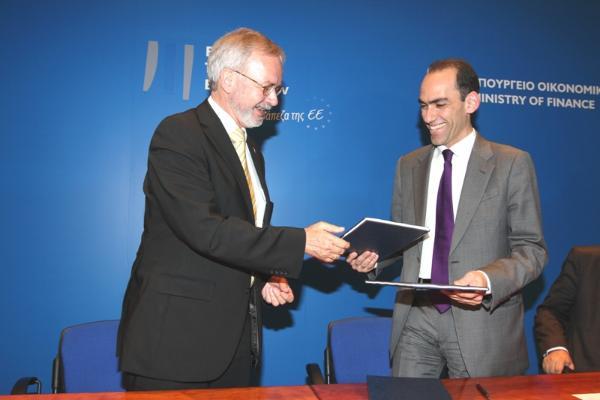
The European Investment Bank (EIB) is to provide EUR 100 million for key investments in Cyprus. The loan will be used to part-finance investments totalling EUR 1 177 million in areas identified under the National Strategic Reference Framework for the 2007-2013 period, which include improving the competitiveness of the Cypriot economy, promoting sustainable development, and investing in skills and innovation. It will therefore contribute to the smart, sustainable and inclusive growth of the Cypriot economy in line with the Europe 2020 strategy. This new loan complements a first loan of EUR 200 million provided in 2012 for the same purpose.
The finance agreement was signed today in Nicosia in a public ceremony. Mr Harris Georgiadis, Minister of Finance, signed on behalf of the Republic of Cyprus and President Werner Hoyer signed on behalf of the EIB in the presence of EIB Vice–President with responsibility for Cyprus, Mr Mihai Tanasescu, during an official visit to Cyprus.
On this occasion, EIB President Hoyer stated: “I am pleased to sign this loan agreement today bringing further EIB support for investment in Cyprus. It comes as a timely boost to the Cypriot economy and enhances the effective use of the EU grant funds allocated to the country. We are joining forces with the European Commission in supporting the priority areas of sustainable development and human capital and building upon the excellent working relationship with the Cypriot authorities. Our presence here today underlines the Bank’s commitment to economic development in Cyprus and our discussions with President Anastasiades aim to strengthen further our cooperation in view of the current economic circumstances.”
This second loan brings total EIB support for key investments in Cyprus to EUR 300 million. EIB finance focuses on solid waste management, renewable energy, skills and innovation and urban development. The investments to be financed are grouped around selected priorities of two comprehensive Operational Programmes (OPs) of the Republic of Cyprus. The schemes implemented within these OPs are expected to contribute primarily to the achievement of objectives in sustainable development and competitiveness as well as employment, human capital and social cohesion. The investments will address long-term objectives of the Cypriot economy in the sectors of solid waste management, port infrastructure, renewable energy, knowledge economy, human capital, SMEs and sustainable urban development.
Examples of projects financed include the improvement of operations of 37 waste sites in the Pafos district, development of a Green Point Network in Cyprus, development of the Open University of Cyprus’s technological infrastructure and regeneration of Limassol’s town centre. The new loan will strengthen the productive base and competitiveness of the Cypriot economy and provide financial added value due to its long tenor and favourable terms. This loan is complemented by technical advice in the form of project preparation provided through the JASPERS initiative. The facility will unlock investments in key infrastructure and regional assets and is expected to assist the country's rate of absorption of EU Structural Funds.
The EIB has also financed the Cypriot national contribution to operational programmes in the 2004-2006 programming period.
In 2012, the EIB provided a total of EUR 398 million in Cyprus, up from EUR 180 million in 2011. The funds were directed at the real economy as an anti-crisis, competitiveness and growth support mechanism for the country. EUR 200 million was for schemes under the National Strategic Reference Framework, EUR 68 million co-financed the Limassol-Amathus Sewerage and Drainage Project, EUR 130 million went to the Electricity Authority of Cyprus for a new production unit at Vassilikos to cater for urgent electricity needs, while SMEs were supported by the European Investment Fund, the EIB subsidiary dedicated to SME support, through the JEREMIE initiative.

Photographer: EIB ©To be defined
Download original